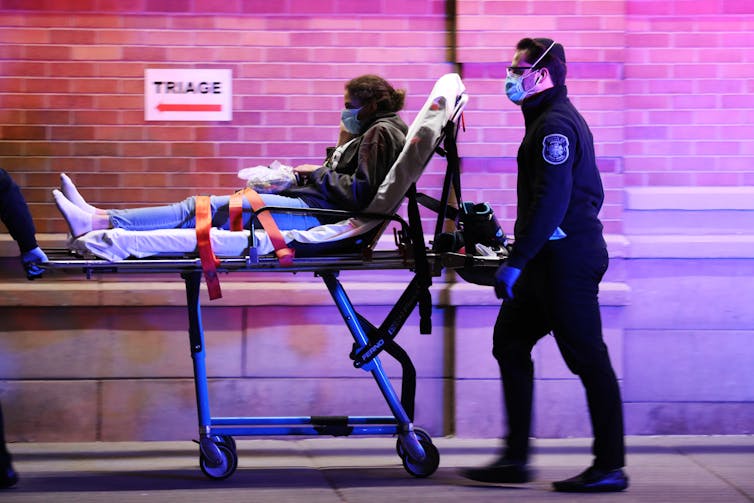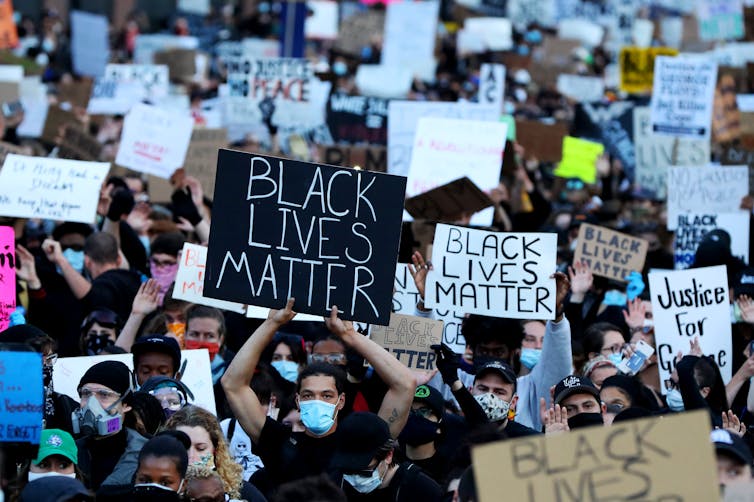Coronavirus deaths and those of George Floyd and Ahmaud Arbery have something in common: Racism
Racism – and the chronic stress it causes – leads to poor health among African Americans. It may change the way genes are expressed, leading to increased levels of dangerous stress hormones.

The COVID-19 pandemic and the deaths of George Floyd and Ahmaud Arbery are two major catastrophes that shine a light on longstanding social inequities and injustices toward African Americans. Emerging research in the field of social genomics demonstrates how social stress, such as racism and discrimination, can shift the body’s biological resources toward a state that increases risk for disease.
For example, our research group has found that racial discrimination may be impacting the way genes are expressed, leading to increased levels of dangerous stress hormones.
These differences were found even when social determinant factors such as poverty and other forms of stress were accounted for. Hence, racial discrimination experiences may also explain why African Americans continue to remain at higher risk for poor medical outcomes, such as cardiovascular disease and hypertension, and psychiatric outcomes, such as depression and anxiety, even when social determinant factors, such as poverty and educational levels, are controlled.
With respect to COVID-19, African Americans represent only 13% of the U.S. population, yet 33% of hospitalized COVID-19 patients. Many public health officials have said that the reason for these disparities may be higher incidence of chronic medical conditions among African Americans.
But is this right, and does it limit the way public health officials and scientists should be looking at the issue? In short, as a clinical neuropsychologist who has studied biological underpinnings of health and disease, I think this is a limited view. First, we must consider relevant biological factors to COVID-19. Racism is a stressor that has been linked to poor health, inflammation and premature biological aging, but I believe there is likely more going on biologically than researchers have previously understood.

Biological regulators of blood pressure are affected
Let’s start with something called the renin-angiotensin system, or RAS. RAS is a hormone system that regulates blood pressure, electrolytes or minerals within the body that help regulate muscle and nerve function, and cardiovascular function.
Within RAS, there is a group of four hormones called angiotensins that can increase blood pressure. One of the types of angiotensins, called ANG II, is produced within the brain. In response to stress, ANG II or another type of angiotensin called ANG-(1–7) becomes activated to increase blood pressure. Just how much ANG II is released? Well, that depends on the duration of stress and RAS activation levels at the time of stress.
Another key regulator of RAS, called angiotensin-converting enzyme 2 (ACE2), works to lower blood pressure. It does this by breaking down ANG II into ANG (1-7). ACE2 can be found on the surface of cells in the lungs, arteries, heart, kidney and intestines.
Researchers have discovered that ACE2 is also the key entry receptor for COVID-19. A few studies have found racial differences in ACE2 activity, showing that African Americans produce higher levels of Ang II – which leads to higher rates of hypertension – and lower ACE2 activity.
Lower ACE2 activity is also involved in lung injury after SARS-CoV-2 infection. Elevations in Ang II have been directly related to COVID-19 severity. Therefore, abnormal regulation of the RAS system in response to chronic stress may be one explanation why African Americans are at higher risk for severe COVID-19 outcomes.

The immune system becomes overstressed
A second factor may also reflect dysfunctions in the body’s innate, or immediate, and adaptive, or prolonged, immune responses. Both responses are evolutionarily designed to defend against and prevent the spread of pathogens. The immune system is complex, and it requires sophisticated coordination among a range of cells and molecules within the body.
A key part of the body’s immune and inflammatory response is small proteins called cytokines. These proteins are secreted by cells for the purpose of signaling and communication between cells. Different cytokines have different duties and activity, and they can elicit a variety of responses once they bind to a receptor.
Abnormalities in the adaptive immune response may cause the immune system to attack its own cells and tissue by causing cytokines to go awry. This is called a “cytokine storm.” Doctors have been seen this reaction in severe cases of COVID-19.
Inflammation associated with a cytokine storm begins at a local site – for example, within the lung – and spreads throughout the body. The over-response of a cytokine storm damages tissue. And while healing of the target site may occur, persistent organ dysfunction can occur as a result of cytokine storms.
Doctors do not yet totally understand the precise mechanisms driving cytokine storms. What they do know is that stress can cause a chronic immune response in addition to an increase in cytokines.
We all experience stress, and, for the most part, stress exposure allows a person to build character and resiliency. However, stress that is chronic, uncontrollable and unpredictable can wreak havoc on the mind and body.
And worse, racism and discrimination are unique stressors because they pose a clear social threat to survival. Unlike many other forms of stress, such as losing one’s job, divorce or even being diagnosed with an illness, you cannot problem-solve or prevent it from happening. This is best illustrated by the unconscionable deaths of George Floyd and Ahmaud Arbery. African Americans have been a target group for racism, discrimination and police brutality for decades.

Racial discrimination and the immune system
Collectively, there appear to be two potential pathways that may explain why African Americans are hardest hit by many illnesses, including COVID-19.
First, stress from racial discrimination alters the innate immunity of a host to promote abnormal inflammatory responses. Stress activates hormones in the brain that are involved in blood pressure and cardiovascular function, each of which contributes to medical conditions such as hypertension and cardiovascular disease, that increase COVID-19 risk.
Second, dysfunction of the RAS and innate and adaptive immune system may alter host innate immunity to promote abnormal inflammatory responses. This could therefore increase risk for severe COVID-19 outcomes, should one become infected.
The crisis generated by the COVID-19 pandemic and the deaths of George Floyd and Ahmaud Arbery has forced us to confront issues of injustices and health disparities. While considerable efforts are being made to “flatten the COVID-19 curve,” these efforts do not negate the damage that has already been done, particularly in the African American community. We need to ask ourselves why these social inequities and injustices continue to persist.
I believe the answer lies in a close examination of structural forms of racism and discrimination toward African Americans. These unfortunate events provide an opportunity to take a hard look at the longstanding social inequities and injustices that permeate the African American experience. Understanding potential biological contributors to severe health outcomes such as COVID-19 in African Americans may aid in improved health for all.
[You need to understand the coronavirus pandemic, and we can help. Read The Conversation’s newsletter.]
April Thames receives funding from National Institute on Mental Health
Read These Next
Meekness isn’t weakness – once considered positive, it’s one of the ‘undersung virtues’ that deserve
The word ‘meekness’ might seem old-fashioned – and not a positive trait. But understanding its…
As war in Ukraine enters a 5th year, will the ‘Putin consensus’ among Russians hold?
Polling in Russia suggests strong support for President Vladimir Putin. Yet below the surface, popular…
Enforcing Prohibition with a massive new federal force of poorly trained agents didn’t go so well in
Both Prohibition and current mass deportation efforts were hastily built, staffed by people permitted…






